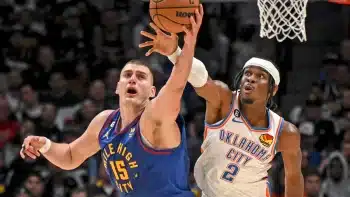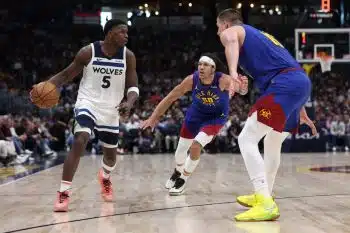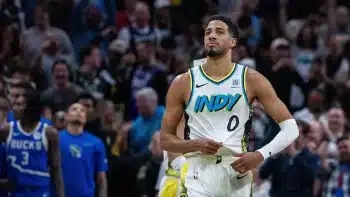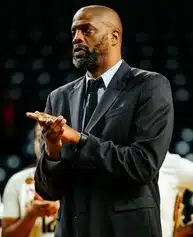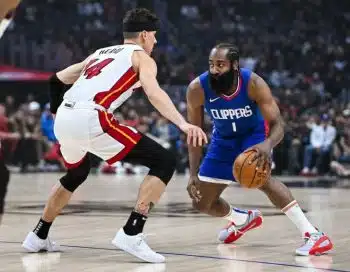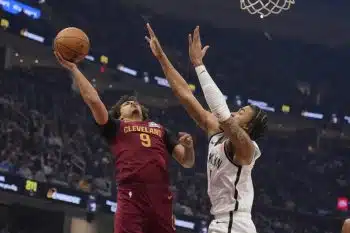College Basketball
FAU Coach Dusty May Accuses Top Schools of Poaching Owls Players During March Madness
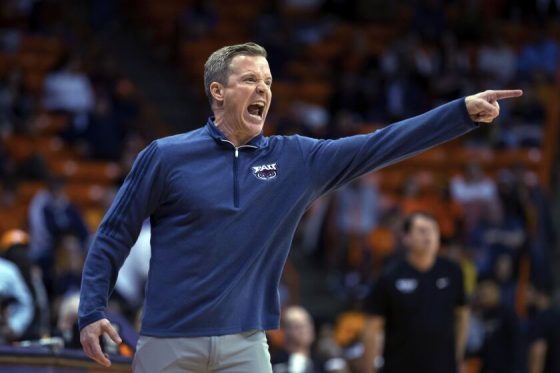
As the Florida Atlantic University (FAU) Owls swooped into the NCAA Final Four, their underdog story captured hearts nationwide. But the team’s fairy tale run has been marred by behind-the-scenes drama. FAU head coach Dusty May accuses big-name schools of trying to poach his players amidst the March Madness excitement.
May Says FAU Players Recruited at Madison Square Garden During NCAA Tournament
A nine-seed Cinderella story, FAU’s journey to the Final Four has been nothing short of exhilarating. However, the glitz and glamour on the court mask the shady dealings happening offstage.
Player poaching is nothing new in college sports, but the introduction of the Name, Image, and Likeness (NIL) legislation and the transfer portal has changed the game. The NIL rules allow student-athletes to profit from their personal brand and many are earning hundreds of thousands of dollars doing so. Meanwhile, the transfer portal simplifies player movement between programs. These changes have given rise to a new breed of opportunists: middlemen.
According to Coach May, these middlemen are the ones orchestrating the poaching efforts. As FAU advanced to the Elite Eight at Madison Square Garden, May claims that top schools targeted the Owls’ best players through third-party intermediaries.
May expressed his concerns before FAU’s victory over Kansas State: “You’re always concerned because they’re getting recruited now. They’ve been recruited through this (NCAA) tournament. It’s part of it.”
May emphasizes that the coaches’ job is to create an environment that convinces players FAU is their best long-term option.
NIL Collectives Acting as Middlemen?
While May isn’t pointing fingers at other coaches directly, he’s clear about the role of middlemen: “There are middlemen, third parties that have incentive to get kids in the portal and help them find another spot and then with the new rules who know what happens after that.”
May also acknowledges that poaching isn’t a one-way street: “Every school in the country in some capacity is dealing with it. Even the bigger schools are dealing with the small schools trying to get the guys at the end of their roster.”
NIL collectives currently play a unique role in this landscape. These organizations pool resources to support student-athletes in exchange for a share of the players’ NIL earnings. While this arrangement can benefit athletes, it also opens the door for middlemen to use NIL deals as bait for poaching.
As FAU prepares to face San Diego State in the Final Four on Saturday, the Owls’ tale serves as a cautionary story for smaller programs. The NIL legislation and transfer portal have opened doors for student-athletes, but they’ve also exposed smaller schools like FAU to a more insidious side of college sports.
As the Owls fight for a place in the championship game, the unseen battle rages on behind the scenes. Coach Dusty May’s revelations remind us that amidst the thrill of March Madness, there’s a darker side to the quest for success.
Check Out More of Our March Madness College Gambling 2025 Guides
- Best March Madness Betting Websites – Discover Top March Madness Sports Gambling Sites Reviewed.
- Best March Madness Betting Odds – In-depth Guide to the Latest March Madness Betting Odds and Lines.
- How to Gamble on March Madness – Learn all You Need to Bet on NCAA March Madness 2025.
- March Madness Picks and Predictions 2025 – Find out the Best NCAA March Madness Betting Tips.
- March Madness Bracket Predictions 2025 – NCAA March Madness Bracket Betting Guide.
- Best College Basketball Betting Sites 2025 – Discover Top NCAAB Betting Sites Ranked.
- First Round March Madness – Discover Best 1st Round March Madness Betting Tips in 2025.
- Second Round March Madness – Discover Best 2nd Round March Madness Betting Tips in 2025.
- March Madness Sweet 16 Gambling – Compare The Best March Madness Sweet Sixteen Betting Sites in 2025.
- March Madness Elite 8 Online Gambling – Discover The Best Sportsbooks for Elite 8 March Madness Betting in 2025.
- March Madness Final Four Gambling – Discover The Best Sportsbooks for Final 4 March Madness Gambling in 2025.
- March Madness National Championship Winner – Compare best March Madness National Champion Odds and Picks.
- March Madness Free Bets – Discover Best Top NCAAB Betting Bonuses in 2025.
- March Madness Results 2025 – NCAA Results & Scores Betting Guide.
- March Madness Schedule 2025 – Discover All March Madness Game Times & Dates.
